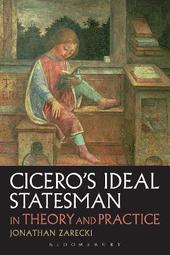
|
Cicero's Ideal Statesman in Theory and Practice
Paperback / softback
Main Details
| Title |
Cicero's Ideal Statesman in Theory and Practice
|
| Authors and Contributors |
By (author) Jonathan Zarecki
|
| Physical Properties |
| Format:Paperback / softback | | Pages:224 | | Dimensions(mm): Height 234,Width 156 |
|
| Category/Genre | Social and political philosophy |
|---|
| ISBN/Barcode |
9781474261883
|
| Classifications | Dewey:320.01 |
|---|
| Audience | | Tertiary Education (US: College) | | Professional & Vocational | |
|---|
|
Publishing Details |
| Publisher |
Bloomsbury Publishing PLC
|
| Imprint |
Bloomsbury Academic
|
| Publication Date |
22 October 2015 |
| Publication Country |
United Kingdom
|
Description
The resurgence of interest in Cicero's political philosophy in the last twenty years demands a re-evaluation of Cicero's ideal statesman and its relationship not only to Cicero's political theory but also to his practical politics. Jonathan Zarecki proposes three original arguments: firstly, that by the publication of his De Republica in 51 BC Cicero accepted that some sort of return to monarchy was inevitable. Secondly, that Cicero created his model of the ideal statesman as part of an attempt to reconcile the mixed constitution of Rome's past with his belief in the inevitable return of sole-person rule. Thirdly, that the ideal statesman was the primary construct against which Cicero viewed the political and military activities of Pompey, Caesar and Antony, and himself.
Author Biography
Jonathan Zarecki is Assistant Professor of Classics at the University of North Carolina at Greensboro, USA.
ReviewsWhile his thesis may not convince every analyst of Cicero's works, Zarecki has done a first-rate job at exploring the motives and passions of Cicero, who resolved to live with dignity under what he believed to the tyranny of Julius Caesar. I found his case well-put and compelling. -- Clifford Cunningham * Sun News Miami * On the whole, Zarecki offers an important and timely reconsideration of a shadowy and ill-understood figure. ... His book makes a persuasive case that a greater degree of continuity existed between the articulation of this ideal and Cicero's political analyses and activities in the 40's than has generally been acknowledged hitherto. -- Grant A. Nelsestuen , University of Wisconsin-Madison * New England Classical Journal 42.1 * The last twenty years or so have seen a sustained and renewed interest in Cicero's political thought ... Zarecki's book is an interesting, thought-provoking, and refreshing contribution to this trend of studies ... The book is very clearly written, its exposition is linear, and the development of the argument is repeatedly signposted throughout the work. This is one of the aspects, coupled with narrative accounts, which makes the book very accessible also to advanced undergraduate students ... much here will be of relevance for those interested not only in Cicero's political thought, but also in the political events that punctuated the end of the Roman Republic. -- Valentina Arena, University College London * Bryn Mawr Classical Review * Neglected for the 20th century, Roman political thought has seen a recent resurgence of scholarly interest, with classicists, political theorists, and philosophers contributing to a cross disciplinary conversation. Cicero has been of particular importance to this renaissance, and Zarecki has added an important contribution to this scholarship in his original book ... Zarecki's book has many virtues: it takes seriously the challenge of interpreting Cicero's writings across distinct genres. The outcome is valuable partly because it avoids the generic constraints on a thinker who's project transcends genre, and partly because it presents a holistic portrait of an individual who is both theorist and practitioner. -- Daniel Kapust * CJ-Online * A fascinating study of the intellectual journey made by someone who was a top barrister, a leading philosopher and a senior politician in the last years of the Roman republic ... The book will appeal to anyone who has an interest in political theory. * Classics For All Reviews * Zarecki's bold position on Cicero's continuous engagement with the figure of the rector rei publicae will interest all Ciceronian scholars. * Archiv fur Geschichte der Philosophie * Zarecki has produced an interesting study with an innovative approach, that offers an informative overview of Cicero's ideal statesman. * Bochumer Philosophisches Jahrbuch fur Antike und Mittelalter (Bloomsbury translation) * An altogether worth reading book in which the well-understandable, refreshingly clear style and the stringent argumentation should be emphasized. * H-Soz-Kult (Bloomsbury Translation) *
|